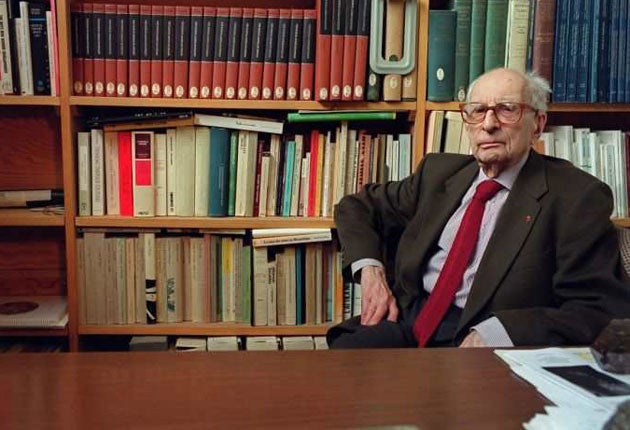Grand chieftain of anthropology lives to see his centenary
Claude Lévi-Strauss did not see the West as superior

France celebrated the 100th anniversary yesterday of the birth of one of the greatest thinkers of the 20th century. This was not just a centenary. It was a genuine birthday. Claude Lévi-Strauss, the father of structuralism and modern anthropology, born on 28 November 1908, is still alive. His work, after going out of fashion several times, is more alive than ever.
In an extraordinary career, which took him from the Amazon rainforests to US academia, by way of King's Lynn, Lévi-Strauss stood anthropology on its head by refusing to see Western civilisation as superior and unique. He was the first man to argue scientifically that the minds and cultures of so-called "primitive" or "savage" peoples were not inferior – or even different – to those of the allegedly "civilised" West. His work developed the idea of "structuralism", broadly speaking, the idea that patterns of thought and behaviour are determined by characteristics of the human brain which remain fixed wherever it may live.
His arguments influenced a new approach to the understanding – or some say over-analysis – of art and literature, which remains influential to this day. He was also one of the first modern thinkers to challenge the notion of "progress" and to warn of the likely fate of mankind if we continue to ravage the planet.
After studying law and philosophy at the Sorbonne, the 23-year-old Lévi-Strauss set out on a completely new path after a late-night conversation with Lewis Daly, a British crypto-zoologist, or expert on mythical creatures. Their conversation was in, of all places, King's Lynn in Norfolk in 1931.
The young Frenchman, born into a French-Jewish artistic family in Brussels, took an academic job in Brazil. His pre-war studies of allegedly "primitive" Amazon peoples became the basis for his life's work. To mark his centenary, there are several exhibitions in Paris, including a free tour of Lévi-Strauss collections in the museum of non-Western art at the Quai Branly in Paris, which opened two years ago. No less than 1,478 of the South and North American artefacts in the museum were brought by Lévi-Strauss.
He remained active into his 90s and attended meetings of the Académie Française until three or four years ago. He lives in the 16th arrondissement of Paris, where he was brought up. His last public appearance was at the opening of the Quai Branly museum in 2006.
Although Lévi-Strauss is sometimes claimed as an intellectual of the left, he believes in the profound importance of tradition. He campaigned against the admission of women to the Académie Francaise on the grounds that it had never been allowed before.
He was also one of the few French intellectuals to attack one of the great gurus of the French left, Jean-Paul Sartre. Lévi-Strauss dismissed Sartre's existentialism – the assertion that each individual is responsible for the morality of his own actions – as a "trashy novel philosophy". In his books, such as Tristes Tropiques (1955) and La Penseé Sauvage (1962), Lévi-Strauss argues the opposite, that there are "universal laws of human thought" which sustain all cultures. The same founding myths and the same kinship patterns, rooted in an abhorrence of incest, appear independently in cultures all over the world.
In his last published interview, in Le Monde in 2005, Lévi-Strauss was pessimistic. "The world I knew and loved had 2.5 billion people in it," he said. "The terrifying prospect of a population of 9 billion has plunged the human race into a system of self-poisoning."
Join our commenting forum
Join thought-provoking conversations, follow other Independent readers and see their replies
Comments